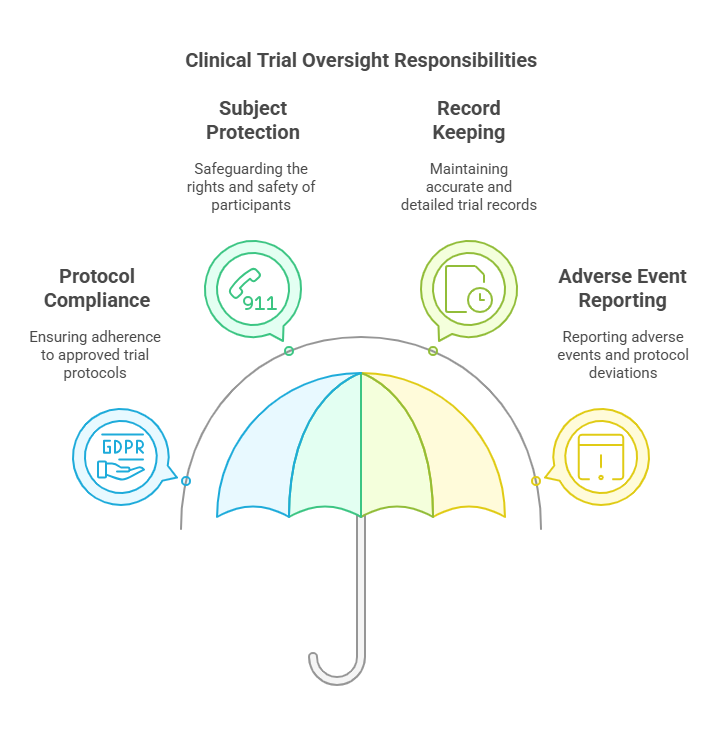What Are a Clinical Investigator's Responsibilities?
Clinical investigators play an essential role in maintaining the integrity and safety along with efficiency of clinical trials. The clinical investigator's oversight determines both trial success and participant safety when testing new drugs or medical devices or treatment approaches. Professionals who want to enter clinical research or advance their careers need to understand the complete responsibilities of clinical investigators.
In this comprehensive guide, we will explore the fundamental responsibilities of a clinical investigator, providing insights into the ethical and regulatory frameworks governing their role. We will also highlight key duties, discuss relevant skills, and offer suggestions for ongoing professional development in this vital area of clinical research.
1. Role of a Clinical Investigator
A clinical investigator is usually a physician or other healthcare professional who is in charge of running a clinical trial at a specific site. The clinical investigator makes sure that the trial is conducted in accordance with the protocol, in compliance with the principles of Good Clinical Practice (GCP) and in accordance with the relevant regulations.
The clinical investigator either collaborates directly with the trial sponsor or contributes to a larger research group. The investigator's main duty in any environment remains to safeguard participant rights and safety and well-being from the start to the end of the trial.
Key responsibilities include:
Ensuring the trial is conducted according to the approved protocol.
Protecting the rights and safety of human subjects.
Maintaining accurate and detailed records of trial activities.
Reporting adverse events and protocol deviations to the sponsor and regulatory bodies.
2. Pre-Trial Responsibilities
Before the trial begins, the clinical investigator has several key responsibilities to ensure that the trial is set up for success:
Protocol Review and Approval: The clinical investigator needs to carefully examine the study protocol to guarantee that it is scientifically valid and ethically sound and practically implementable at the investigator’s site. Any concerns or modifications should be discussed with the sponsor before the trial begins.
Institutional Review Board (IRB) Approval: The investigator must get approval from the IRB or ethics committee for the study. The IRB makes sure that the trial is ethical and that the rights of participants are protected.
Site Preparation: The investigator is also responsible for ensuring that the clinical trial site is ready, that there are appropriate facilities, staff and equipment to be able to perform the study as described in the protocol. The site must also be prepared for inspections by regulatory authorities at any time during the trial.
Staff Training: Training the trial staff is a critical responsibility. The clinical investigator must ensure that all personnel involved in the trial understand their roles, the protocol, and GCP guidelines.
Informed Consent Process: Before enrolling participants, the clinical investigator is tasked with obtaining informed consent from all potential participants. This process includes explaining the nature, risks, and benefits of the study to the participants, ensuring that they understand their rights, and answering any questions they may have. The informed consent document must be signed before any study-related procedures are performed.
3. Responsibilities During the Trial
Once the trial is underway, the clinical investigator's responsibilities shift toward day-to-day oversight of the study’s operations:
Protocol Adherence: The clinical investigator must ensure strict adherence to the study protocol. Any deviations from the protocol, whether intentional or accidental, must be documented and reported to the sponsor and the IRB. If changes to the protocol are needed, the investigator must seek approval from the IRB before implementing them.
Safety Monitoring: Participant safety is of paramount importance in any clinical trial. The investigator is responsible for monitoring the safety of participants, reporting any adverse events (AEs) or serious adverse events (SAEs) to the sponsor and relevant authorities, and taking action if necessary to protect participants.
Data Collection and Record Keeping: Accurate data collection and record keeping are essential for the validity of a clinical trial. The investigator must ensure that all trial data is collected according to the protocol, documented in case report forms (CRFs), and stored securely. This includes maintaining records of participant visits, medical histories, and any changes in health status during the trial.
Participant Welfare: Throughout the trial, the investigator must maintain communication with participants, monitor their progress, and address any concerns they may have. If a participant wishes to withdraw from the trial, the investigator must respect their decision and ensure that their withdrawal is documented appropriately.
Interim Reporting: Depending on the trial's length and complexity, the investigator may be required to provide interim reports to the sponsor or regulatory authorities. These reports may include data on participant recruitment, adherence to the protocol, adverse events, and preliminary findings.
4. Post-Trial Responsibilities
Once the clinical trial is completed, the clinical investigator’s responsibilities continue with the wrap-up phase, ensuring that the trial is closed properly and that data is handled with integrity:
Final Data Collection: The investigator must ensure that all data is collected and recorded before closing the trial. This includes ensuring that any outstanding CRFs are completed and that all trial-related documents are in order. Final reports must be prepared and submitted to the sponsor and regulatory authorities.
Participant Follow-Up: Depending on the study design, the investigator may need to follow up with participants after the trial has ended to monitor their health and any long-term effects of the intervention. This follow-up may be necessary to assess the safety and efficacy of the treatment in the long term.
Regulatory Compliance and Audits: The clinical investigator is responsible for ensuring that the trial site is ready for any regulatory audits or inspections that may occur after the trial has ended. This includes maintaining all trial records for the required length of time, as specified by regulatory authorities.
5. Ethical and Legal Responsibilities
One of the most significant responsibilities of a clinical investigator is maintaining ethical standards throughout the trial. This includes following the Declaration of Helsinki and Good Clinical Practice (GCP) guidelines, which provide a framework for conducting ethical research.
Confidentiality: The investigator must ensure that participant confidentiality is maintained throughout the trial. Personal information should only be accessible to authorized personnel and must be stored securely to prevent unauthorized access.
Informed Consent: The informed consent process is not a one-time event but an ongoing responsibility. Investigators must continue to provide participants with updated information about the trial, especially if new risks or findings emerge.
Transparency and Reporting: The investigator must report all findings accurately and transparently, even if the results are negative or unfavorable to the sponsor. This transparency is vital to the credibility of the research and the scientific community at large.
6. Developing Skills as a Clinical Investigator
Being an effective clinical investigator requires continuous professional development. The responsibilities of an investigator are dynamic, particularly as regulatory standards evolve and new treatments emerge. To stay competitive, clinical investigators should invest in ongoing education and training.
Certifications and Courses: Pursuing certifications like the ICH GCP Certification is an excellent way to ensure that you stay updated on the latest regulatory requirements and best practices. These certifications also demonstrate a commitment to quality and professionalism in clinical research.
Workshops and Seminars: Attending industry workshops and seminars provides clinical investigators with opportunities to learn about new methodologies, regulatory updates, and emerging trends in clinical research. Networking with peers and experts in the field can also offer valuable insights.
Collaboration: Working closely with colleagues in clinical research, both at your site and across different institutions, is crucial for staying informed about best practices and new developments.
Conclusion
In summary, a clinical investigator plays an essential role in the successful execution of clinical trials. Their responsibilities span every stage of the trial, from planning and obtaining ethical approval to conducting the trial and ensuring participant safety. They must also navigate the complexities of regulatory compliance and ethical guidelines, ensuring that each trial contributes meaningfully to the advancement of medical science.
Continuous education, such as pursuing Clinical Research Coordinator Certification from the Clinical Research Professional Society (CCRPS), is critical for remaining current with the evolving demands of the field. By upholding the highest standards of ethics, safety, and scientific integrity, clinical investigators ensure that their work not only advances healthcare but also protects the individuals who participate in clinical trials.
Explore Courses
Courses Available:
Reference Links:
U.S. Food & Drug Administration (FDA) - Responsibilities of Clinical Investigators
National Institutes of Health (NIH) - Good Clinical Practice Training
World Health Organization (WHO) - Ethical Guidelines for Clinical Research
European Medicines Agency (EMA) - Guidelines for Clinical Trial Conduct





